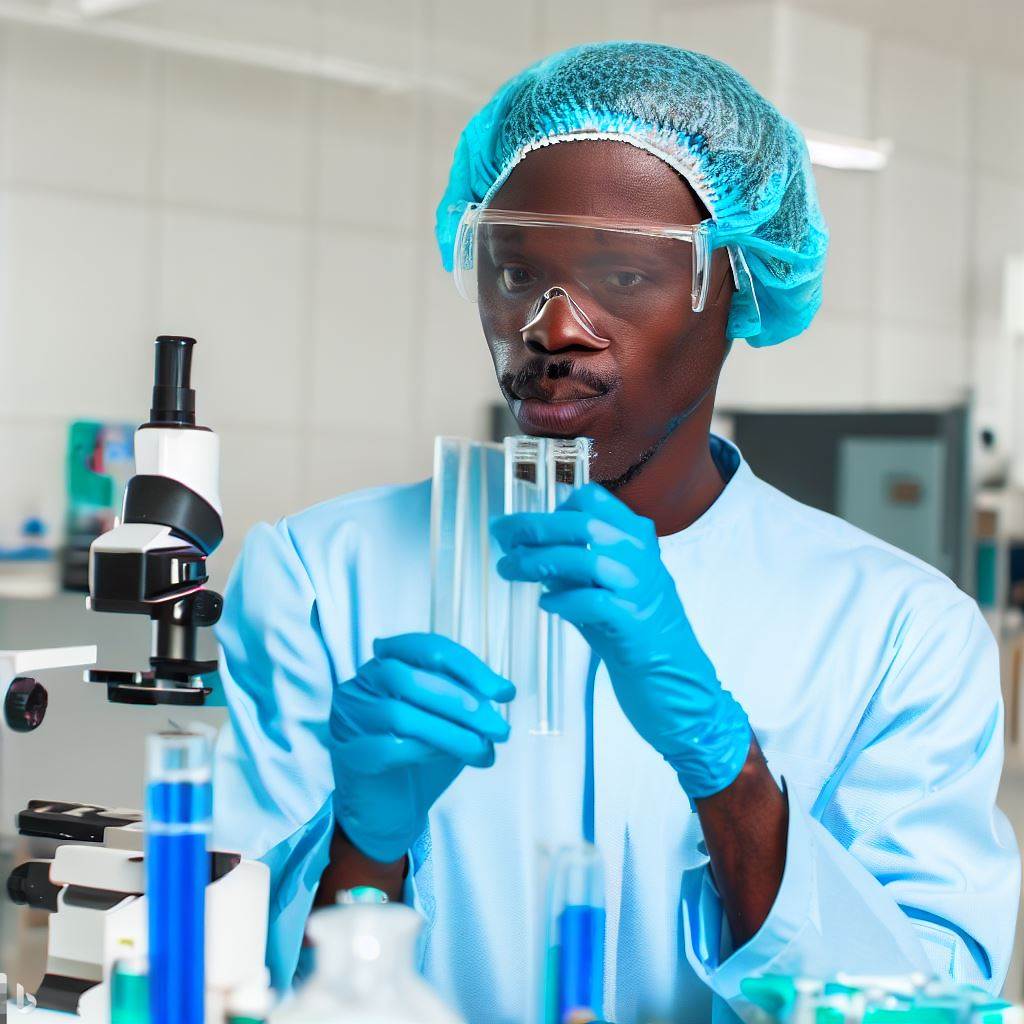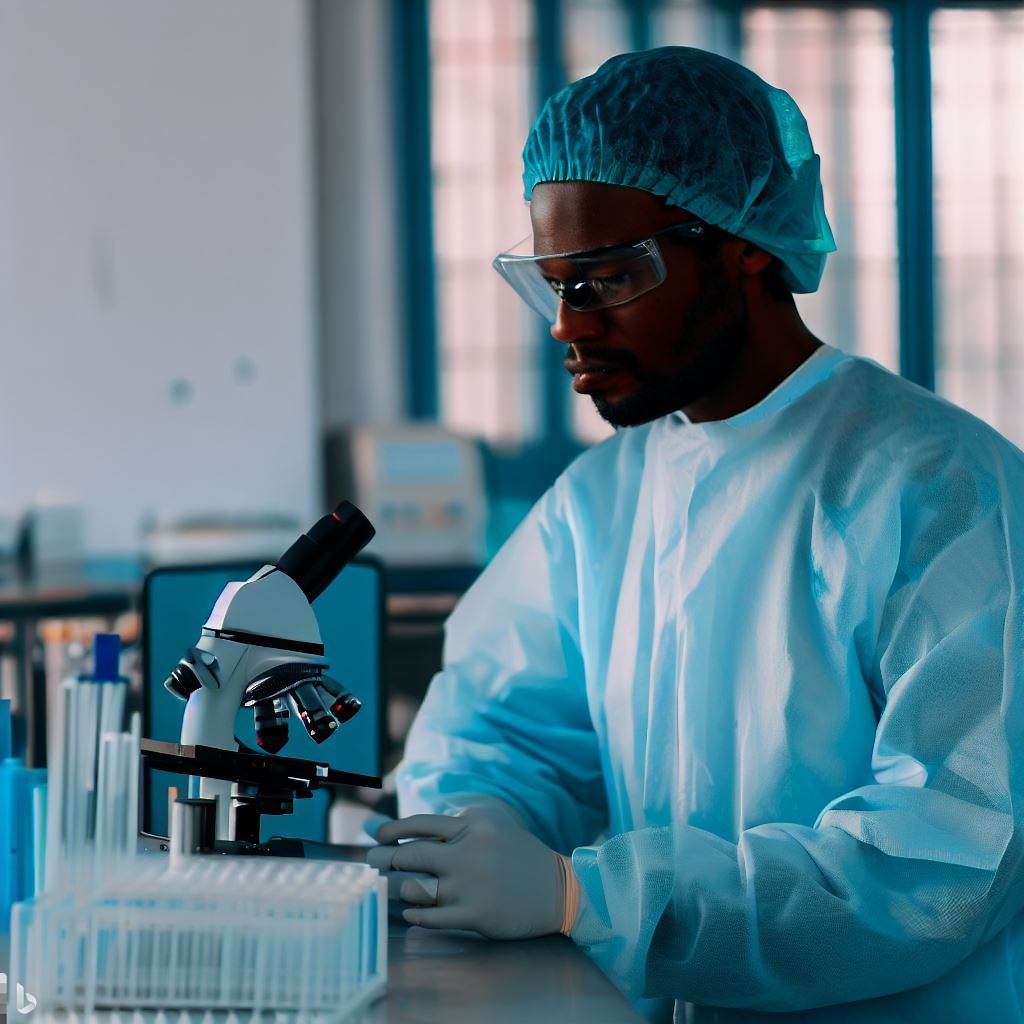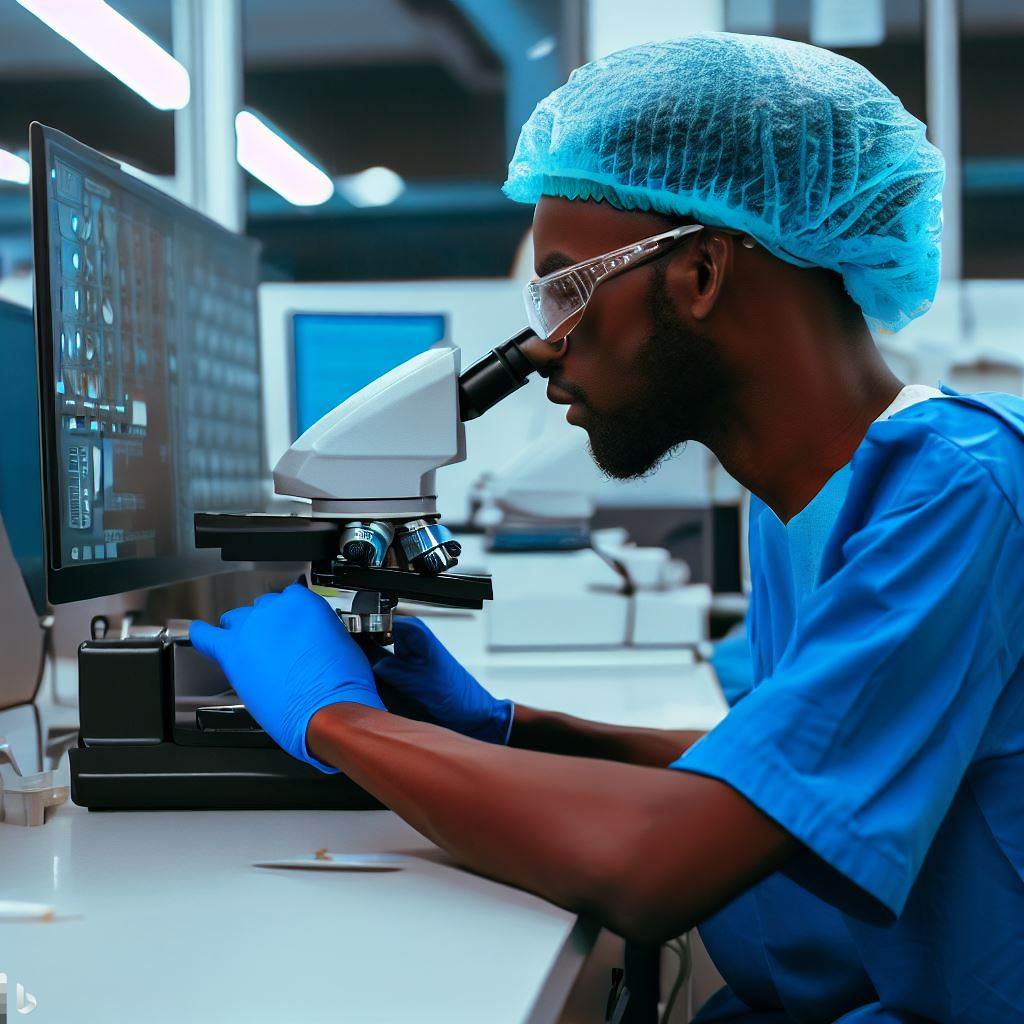Introduction
Health and safety are crucial for lab technicians in Nigeria to ensure a safe working environment. Lab technicians play a vital role in various sectors, including healthcare, research, and industry.
Importance of health and safety for lab technicians
Health and safety measures are essential for lab technicians to protect themselves from harmful chemicals, biological hazards, and accidents.
These measures also safeguard the integrity of experiments, data accuracy, and the overall quality of lab results.
Overview of the lab technician profession in Nigeria
Lab technicians in Nigeria are trained professionals who conduct diagnostic tests, calibrate equipment, and ensure accurate analysis.
They work in medical laboratories, research institutes, and industrial settings, contributing to advancements in healthcare, agriculture, and manufacturing.
Lab technicians are responsible for maintaining cleanliness, organizing supplies, and adhering to protocols and procedures.
They also handle hazardous materials, comply with disposal regulations, and maintain proper documentation.
Lab technicians work closely with scientists, doctors, and other healthcare professionals, providing them with crucial information for diagnosis, treatment, and research.
They assist in identifying diseases, monitoring patient conditions, and conducting experiments that lead to groundbreaking discoveries.
To ensure health and safety, lab technicians must wear appropriate personal protective equipment, conduct regular equipment maintenance, and follow strict guidelines.
They should be aware of potential hazards, emergency procedures, and how to handle accidents or spills promptly.
In the end, health and safety are paramount for lab technicians in Nigeria.
They play a vital role in various sectors and must adhere to guidelines and procedures to protect themselves, their colleagues, and the integrity of their work.
Hazards in the laboratory
Chemical hazards
Common hazardous substances used in labs include acids, solvents, and toxic chemicals.
Proper handling, storage, and disposal of these substances are crucial to ensure safety.
Transform Your Career in Nigeria
Discover unmatched expertise with our personalized Career Consulting service. Navigate Nigeria’s job market with a strategy tailored just for you.
Get StartedBiological hazards
Laboratory technicians may face potential exposure to pathogens and microorganisms.
Following guidelines for preventing infections and diseases is essential for their health and safety.
Physical hazards
Potential dangers in the laboratory include electrical hazards, fires, and explosions.
Introduction to safety measures is important to minimize risks associated with these hazards.
Read: Lab Technician Salary and Benefits in Nigeria: A Guide
Personal Protective Equipment (PPE)
Explanation of Different Types of PPE Necessary for Lab Technicians
- Lab coat: Protects clothing from stains, chemicals, and biological agents.
- Gloves: Prevents direct contact with hazardous substances and prevents contamination.
- Goggles/face shield: Shields eyes and face from chemical splashes, flying particles, and biological materials.
- Respirator: Filters air and protects against inhalation of harmful gases, fumes, or airborne particles.
- Footwear covers: Prevents chemical spills from contacting the feet and prevents slipping.
Detailed Overview of Each PPE and When to Use Them
- Lab coat: It should be worn whenever working with chemicals or biological materials, providing full coverage to protect the body from potential splashes or spills.
- Gloves: They should be worn when handling any hazardous substances, including chemicals, microbiological agents, or sharp objects.
- Goggles/face shield: These protective devices should be used whenever there is a risk of chemical splashes, flying particles, or biological material exposure to the eyes or face.
- Respirator: A respirator must be used in situations with airborne hazards like toxic fumes, gases, or airborne particulates, following proper fit testing and training.
- Footwear covers: These covers should be worn when there is a risk of chemical spills on the floor or when moving between areas with different contamination levels.
Importance of Proper Use and Disposal of PPE
Proper use and disposal of PPE are crucial to ensure the well-being of lab technicians and prevent occupational hazards.
Using PPE correctly reduces the risk of exposure to hazardous substances and minimizes the potential for accidents or injuries.
Disposal of contaminated PPE should be done according to established protocols to prevent environmental contamination and further exposure to harmful materials.
Regular inspection, maintenance, and replacement of PPE are necessary to guarantee its continued effectiveness in safeguarding the health and safety of lab technicians.
Addressing the Challenges of Accessing Quality PPE in Nigeria
Nigeria faces significant challenges in accessing quality PPE for lab technicians, hindering the achievement of optimal safety standards.
Factors such as limited availability, high costs, inadequate infrastructure, and lack of awareness contribute to this problem.
Efforts should be made to improve local manufacturing, establish quality control measures, and invest in training to ensure the availability and affordability of reliable PPE.
Collaboration between government agencies, regulatory bodies, and stakeholders can help address these challenges and enhance the safety culture within Nigerian laboratories.
By prioritizing the use of appropriate PPE, lab technicians in Nigeria can minimize occupational risks and promote a healthier working environment.
Your Unique Story, Perfectly Told
Don't let your dream job slip away with a generic resume. We craft personalized resumes and cover letters that highlight your unique strengths, making you unforgettable to Nigerian employers.
Get HiredRead: Understanding the Lab Technician Certification in Nigeria
Procedures for safe lab practices
General lab safety guidelines
- Always wear appropriate personal protective equipment (PPE) such as gloves and lab coats.
- Ensure that all equipment and instruments are properly maintained and calibrated.
- Follow standard operating procedures (SOPs) for each experiment or procedure.
- Minimize distractions and maintain focus while working in the lab.
- Report any accidents, incidents, or near misses to the designated authority immediately.
- Keep emergency exit routes clear and easily accessible at all times.
- Regularly inspect and maintain safety equipment, such as fire extinguishers and safety showers.
- Prohibit eating, drinking, or smoking in the lab to prevent contamination and exposure.
- Follow appropriate guidelines for electrical safety, such as avoiding overloading outlets and using grounded plugs.
- Keep the lab well-ventilated to minimize exposure to hazardous fumes or vapors.
Proper handling and containment of hazardous substances
- Identify and label all hazardous substances properly, including their potential risks and handling precautions.
- Use designated storage areas or cabinets with proper ventilation and containment features.
- Follow proper procedures for the transfer, disposal, and containment of hazardous substances.
- Avoid direct skin contact with hazardous substances by using appropriate gloves and barrier creams.
- Regularly inspect and maintain safety equipment, such as fume hoods and ventilation systems.
- Implement strict measures to prevent cross-contamination when working with multiple hazardous substances.
- Wash hands thoroughly after handling hazardous substances and before leaving the lab.
- Provide appropriate training and education on the safe handling and containment of hazardous substances.
- Have an emergency response plan in place for accidental spills or releases of hazardous substances.
- Follow proper decontamination procedures for equipment, surfaces, and personal protective equipment.
Guidelines for handling sharps, such as needles and broken glassware
- Handle sharps with extreme caution and only when necessary.
- Use puncture-resistant containers for the disposal of used needles and other sharps.
- Never recap, bend, or break needles after use to prevent accidental injuries.
- Use appropriate gloves and tools when handling broken glassware to avoid cuts or punctures.
- Dispose of broken glass in designated puncture-resistant containers.
- Regularly inspect work areas for any broken or damaged glassware and dispose of them properly.
- Never dispose of sharps or glassware in regular trash bins to prevent injuries to waste handlers.
- Train lab technicians on proper handling and disposal techniques for sharps and broken glassware.
- Implement measures to minimize the use of sharps whenever possible to reduce the risk of injuries.
- Report any incidents related to the mishandling or improper disposal of sharps or broken glassware.
Waste management procedures and proper disposal methods
- Segregate different types of waste into appropriate containers according to their hazard classification.
- Label waste containers clearly with the type of waste and any associated hazards.
- Follow proper disposal methods and regulations for different categories of waste.
- Store hazardous waste in designated areas with proper containment measures.
- Regularly inspect waste storage areas for leaks, spills, or other potential safety hazards.
- Implement waste reduction strategies, such as recycling or reusing materials whenever possible.
- Provide training to lab technicians on waste management procedures and regulations.
- Maintain records of waste disposal, including proper documentation of hazardous waste shipments.
- Follow local, national, and international guidelines for the transportation of hazardous waste.
- Periodically review and update waste management procedures to ensure compliance with current regulations.
Best practices for maintaining a clean and organized workspace
- Regularly clean work surfaces, equipment, and storage areas to prevent cross-contamination.
- Dispose of waste materials in the appropriate containers promptly.
- Keep walkways and work areas clear of obstructions or clutter to minimize the risk of accidents.
- Organize and label chemicals, reagents, and samples properly to facilitate easy identification.
- Implement a system for inventory management to prevent expired or outdated materials from being used.
- Adopt a “clean as you go” approach by cleaning spills and messes immediately.
- Prohibit the accumulation of unnecessary items or equipment in work areas to maintain a clutter-free environment.
- Regularly inspect and maintain equipment, including cleaning and calibrating as necessary.
- Encourage good hygiene practices, such as handwashing and maintaining personal cleanliness.
- Promote a culture of cleanliness and accountability by involving all lab technicians in maintaining a clean workspace.
Read: Nigeria’s Diagnostic Medical Sonographer: A Detailed Job Analysis

Health and well-being of lab technicians
Importance of proper ergonomics and body mechanics
Proper ergonomics and body mechanics are crucial for the health and well-being of lab technicians.
Adopting the correct posture and technique can prevent musculoskeletal injuries and reduce strain on the body.
Investing in adjustable lab equipment and ergonomic furniture can greatly improve comfort and reduce the risk of injury.
Training programs should be provided to educate technicians on proper ergonomics and body mechanics.
Addressing the risks of repetitive strain injuries and musculoskeletal disorders
Repetitive strain injuries (RSIs) and musculoskeletal disorders (MSDs) are common risks faced by lab technicians.
Performing repetitive tasks without breaks or using incorrect techniques can lead to RSIs and MSDs.
Regular breaks should be encouraged to allow the body to rest and recover from repetitive movements. Implementing job rotation and varying tasks can help prevent the overuse of specific muscles and joints.
Read: The Path to Becoming a Surgeon in Nigeria
Importance of taking breaks, maintaining a healthy diet, and staying physically active
Taking regular breaks throughout the workday is essential for the physical and mental well-being of lab technicians.
Breaks allow for relaxation, stretching, and recharging, reducing the risk of injuries and improving productivity.
A healthy diet rich in nutrients and hydration is necessary to support overall health and maintain energy levels.
Engaging in physical activity outside of work helps strengthen muscles, prevent weight gain, and improve mental health.
Transform Your LinkedIn Presence
Don't let your LinkedIn profile blend into the crowd. We uniquely craft profiles that showcase your professional story, making Nigerian recruiters take notice like never before.
Stand OutMental health considerations and stress management techniques
Mental health is as crucial as physical health for lab technicians, and should not be overlooked. Working in a high-pressure environment can lead to stress, anxiety, and burnout.
Implementing stress management techniques such as meditation, deep breathing exercises, and regular breaks can help alleviate stress.
Providing support systems, counseling services, and fostering a positive work environment are essential for promoting mental well-being.
Read: Job Prospects for Clinical Lab Technicians in Nigeria
Training and education
Comprehensive training programs are of utmost importance for lab technicians to ensure health and safety in Nigeria.
Importance of comprehensive training programs
Comprehensive training programs are crucial for lab technicians as they equip them with essential knowledge and skills.
These programs educate technicians on the proper handling of hazardous materials and the use of safety equipment.
By receiving comprehensive training, lab technicians can effectively mitigate risks, prevent accidents, and ensure a safe working environment.
Overview of existing training opportunities in Nigeria
Nigeria provides various training opportunities for lab technicians to enhance their knowledge and capabilities.
Both government and private institutions offer training programs that cover a wide range of topics related to health and safety.
These programs are designed to address the specific needs and challenges faced by lab technicians in Nigeria.
Recommended topics for training
Training programs for lab technicians in Nigeria should include topics such as hazard communication, emergency response, and first aid/CPR.
Hazard communication training ensures that lab technicians understand how to properly identify, label, and handle hazardous substances.
Emergency response training equips technicians with the necessary skills to respond quickly and effectively in case of accidents or emergencies.
First aid and CPR training is crucial for lab technicians to provide immediate medical assistance in case of injuries or cardiac events.
Completion of certifications and continuous professional development
Lab technicians in Nigeria should also focus on obtaining certifications and engaging in continuous professional development.
Certifications validate the expertise and competence of lab technicians, providing assurance to employers and stakeholders.
Continuous professional development ensures that lab technicians stay updated with the latest advancements in health and safety practices.
This can be achieved through attending workshops, conferences, and participating in relevant training programs.
Lab technicians should actively seek opportunities for professional growth to continuously enhance their skills and knowledge.
By investing in training, certifications, and continuous professional development, lab technicians in Nigeria can ensure their own safety and contribute to a safer work environment for everyone.
In essence, comprehensive training programs are paramount for lab technicians in Nigeria to ensure health and safety in the workplace.
Through the inclusion of various topics and certifications, lab technicians can acquire the necessary skills to handle hazards, respond to emergencies, and provide immediate medical assistance.
Continuing education and professional development further enhance their competence and keep them abreast of the latest advancements in the field.
By prioritizing training and education, lab technicians play a crucial role in maintaining a safe and healthy working environment in Nigeria.
Conclusion
In summary, the importance of health and safety for lab technicians in Nigeria cannot be overstated.
It is crucial for every lab technician to prioritize safety and take necessary precautions to protect themselves and others.
We encourage all lab technicians to fully understand and comply with safety protocols and guidelines to prevent accidents and injuries. By doing so, they can help create a safe working environment.
Additionally, it is important for policymakers and employers to recognize the significance of health and safety in laboratories.
Adequate resources, training, and equipment should be provided to ensure the well-being of lab technicians.
There is a need for collaboration between policymakers, employers, and lab technicians to work together in improving health and safety standards.
Regular inspections and risk assessments should be conducted, and any issues or hazards should be addressed promptly.
By strengthening health and safety standards, Nigeria can promote a culture of safety within laboratories and protect the health and well-being of lab technicians.
Let us all take a proactive role in advocating for better health and safety practices, and let’s work together to ensure that every lab technician in Nigeria is protected and can work in a safe environment.
Remember, health and safety are not a choice – they are a responsibility that we all share.




